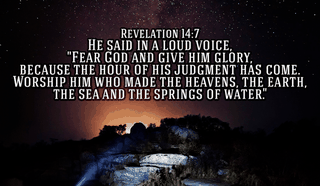
Change Translation
- Recent Translations
- All Translations
Images for Qǐshìlù 14:11

Qǐshìlù 14:11 Meaning and Commentary
And the smoke of their torment ascendeth up for ever and
ever
That is, the smoke of that fire which torments them will for ever arise; or, in other words, there will be no end of their torment; hence their misery is called everlasting fire, everlasting punishment, and everlasting destruction, ( Matthew 25:41 Matthew 25:46 ) ( 2 Thessalonians 1:9 ) and smoke being very troublesome and distressing, is mentioned to set forth the very uncomfortable state of the wicked; and so it is used by Jewish writers: hence we read of (Mnhg Nnt) , "the smoke of hell" {r}, with which the eyes of the wicked will be filled in the world to come: and they have no rest, day nor night;
the fire of divine wrath which tortures them is never quenched, and the worm of conscience which gnaws them never dies: this is directly contrary to a notion of the Jews, that the wicked in hell have rest sometimes; they talk of angels blowing away the smoke from them, so that they have rest an hour and a half; and which they say they have three times a day, and whenever Israel says Amen, let his great name be blessed F19; and particularly that hell fire never burns on the sabbath day, nor does the smoke of it ascend then, and that the wicked have always rest on that days F20; though sometimes they contradict themselves, and say they never have any rest F21, which is the truth: who worship the beast and his image, and whosoever receiveth the
mark of his name;
that is, whoever are the followers of antichrist, or the professors of the Popish religion; so far is salvation from being in the church of Rome, and only there, that there is none in it; and whoever live and die in the profession of Popery, shall surely be damned as this passage is true.
F18 Targum in Psal. xxxvii. 20. T. Bab. Bava Bathra, fol. 75. 1. Caphtor, fol. 109. 1.
F19 Zohar in Gen. fol. 47. 4.
F20 Zohar in Exod. fol. 36. 4. & in Lev. fol. 45. 3. & in Deut. fol. 115. 3. T. Bab. Sanhedrin, fol. 65. 2. Yalkut Simeoni, par. 2. fol. 149. 1. Nishmat Chayim, fol. 39. 1.
F21 Zohar in Exod. fol. 62. 3. T. Bab. Sabbat, fol. 152. 2.
Qǐshìlù 14:11 In-Context
Study Tools
PLUSUnlock Notes
This feature is for PLUS subscribers only. Join PLUS today to access these tools and more.
JOIN PLUSUnlock Highlights
This feature is for PLUS subscribers only. Join PLUS today to access these tools and more.
JOIN PLUSUnlock Bookmarks
This feature is for PLUS subscribers only. Join PLUS today to access these tools and more.
JOIN PLUSTrack Your Reading
Create a free account to start a reading plan, or join PLUS to unlock our full suite of premium study tools.